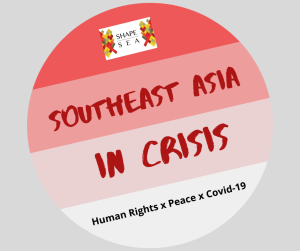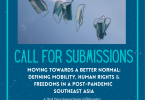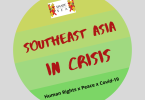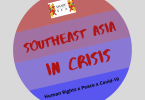Joanda Kevin Yoga AditamaBachelor of Political Science in International Relations of Universitas Muhammadiyah Yogyakarta & Local Engagement Staff of Jogja SDGs
 As stated by Udhi Sudhiyanto, the chief of the Yogyakarta Association of Indonesian Tour and Travel Agencies (ASITA), at the end of March, 100% of tourists had canceled their visit to Yogyakarta (The Jakarta Post, 2020).The situation has worsened since Singapore, the United States, and China, among the top ten countries contributing the most foreign tourists, are suffering severe situations. Tourism is the economic backbone of Yogyakarta. The data from the Yogyakarta Tourism Agency proves that this sector has consistently contributed 25% to local own-source revenue during the 2016-2018 period (Dinas Pariwisata DIY, 2019).Despite insufficient specific data for tourism, in April 2020, 14.055 formal workers and 474 informal workers were laid off in Yogyakarta (Nurhadi, 2020). Many hotels and restaurants are closed and as many as 60% of employees were being furloughed (Wawan, 2020). This situation also impacts informal workers who depend on the tourism sector for their livelihoods, such as andong drivers and pedicab drivers. “This is the quietest situation in 27 years”, said a pedicab driver, illustrating how the pandemic has hit him with a passenger shortfall (Khafifah, 2020).Extension of COVID-19 emergency response statusThe tourism industry in this second popular Indonesian tourist destination must wait longer to recover after Sri Sultan Hamengkubuwono X, the King and the Governor of Yogyakarta, decided to prolong the COVID-19 emergency response status until 30 June 2020. Tourist destinations and other public places will at least be closed until the end of June.To respond, Yogyakarta’s administration has decided to extend the distribution of social assistance until June 2020 (Bhwana, 2020). So far, the local government has prioritised tourism employees affected by the pandemic to join Pra Kerja (pre-employment) program initiated by the national government while it is planned that hotel owners will get tax relief. Likewise, the government plans to give SMEs deferred installments, tax relief, and also pre-employment cards for workers (Huda, 2020).Tourism ™s slow recovery processDuring the emergency period, the local government currently is preparing the ‘new normal’ planned to be implemented in July 2020 (The Jakarta Post, 2020). However, the current situation still does not support the plan to recover in such a short time. Why?First, the Indonesian government is still encouraging people to stay at home and forbids them to travel. Moreover, the Indonesian President, Joko Widodo, indicated that national tourism will not be re-opened hurriedly as the government needs to evaluate the situation first (Afifa, 2020).Second, the majority of foreign countries also seem to be more focused on restoring their national conditions and ensuring the spread of the virus can be minimized before opening international entrances. The virus transmission that continuously surges to this day and travel security that is not yet guaranteed makes people think twice to travel as well (Mufti, 2020).Third, as the economy will not yet fully recover until early next year, traveling may not be the majority of people ™s priority. Thus, in the worse scenario, according to the director of the Center for Reform on Economics (CORE), Mohammda Faisal, tourism will take the longest time to recover compared to other business sectors (Mufti, 2020).Reflections and recommendationsThe pandemic has led to human rights violations. Freedom of movement, as the key to supporting tourism industries, has been limited as the government encourages staying at home and avoiding mass gatherings. Massive lay offs of workers also indicates that the rights of protection against unemployment can’t be fulfilled. Unfortunately, it also results in worse well-being and a health crisis, particularly for tourism industry workers.Here are some recommendations to quickly restore the situation and human rights.First, the local government needs to make sure the social assistance is evenly distributed to affected people, particularly tourism workers, whose standard of health and well-being are being threatened. Second, both local and national governments have to give incentives for a longer period to SMEs and all tourism industry actors, so they can rebuild their business and bring back their employees as well as re-open jobs for informal workers. Third, to re-empower local vendors more quickly, both local and national governments need to rebrand tourism and strongly encourage people to consume local products.References:Afifa, L. (2020, May 28). Jokowi Advises Against Premature Opening of Tourism Sector. Retrieved May 29, 2020, from Tempo: https://en.tempo.co/read/1347150/jokowi-advises-against-premature-opening-of-tourism-sectorBhwana, P. G. (2020, May 28). Yogyakarta Covid-19 Emergency Extended for 1 Month: Sultan HB X. Retrieved May 30, 2020, from Tempo: https://en.tempo.co/read/1346998/yogyakarta-covid-19-emergency-extended-for-1-month-sultan-hb-xDinas Pariwisata DIY. (2019, September 2). Statistik Pariwisata DIY 2018. Retrieved May 30, 2020, from Visiting Jogja: https://drive.google.com/file/d/1dS0c8PRuV1VPvFkeYIm_xAUXJ6gVzF3U/viewHuda, M. (2020, April 10). Ini Besaran Bantuan untuk Pelaku UMKM di DI Yogyakarta yang Terdampak Virus Corona. Retrieved May 30, 2020, from Tribun Jogja: https://jogja.tribunnews.com/2020/04/10/ini-besaran-bantuan-untuk-pelaku-umkm-di-di-yogyakarta-yang-terdampak-virus-coronaKhafifah, N. (2020, March 26). Curhat Tukang Becak di Malioboro: 27 Tahun Mengayuh Becak, Kali Ini Tersepi. Retrieved May 28, 2020, from Kumparan: https://kumparan.com/kumparannews/curhat-tukang-becak-di-malioboro-27-tahun-mengayuh-becak-kali-ini-tersepi-1t6M6W9jWlE/fullMufti, R. R. (2020, April 6). Tourism will take at least a year to recover from COVID-19 outbreak: Economists. Retrieved May 29, 2020, from The Jakarta Post: https://www.thejakartapost.com/news/2020/04/06/tourism-will-take-at-least-a-year-to-recover-from-covid-19-outbreak-economists.htmlNurhadi, M. (2020, April 6). 14.529 Pekerja DIY Kena PHK dan Dirumahkan Akibat Wabah Corona. Retrieved May 30, 2020, from Suara Jogja: https://jogja.suara.com/read/2020/04/06/140000/14529-pekerja-diy-kena-phk-dan-dirumahkan-akibat-wabah-coronaThe Jakarta Post. (2020, May 24). ‘New normal’ protocols to be applied in Yogyakarta in July. Retrieved May 28, 2020, from The Jakarta Post: https://www.thejakartapost.com/travel/2020/05/24/new-normal-protocols-to-be-applied-in-yogyakarta-in-july.htmlThe Jakarta Post. (2020, March 31). Yogyakarta empty of tourists as COVID-19 takes toll . Retrieved May 27, 2020, from The Jakarta Post: https://www.thejakartapost.com/travel/2020/03/31/yogyakarta-empty-of-tourists-as-covid-19-takes-toll.htmlWawan, J. H. (2020, April 3). Imbas Corona, Hotel dan Restoran di Yogyakarta Rumahkan Karyawan. Retrieved May 27, 2020, from Detik: https://travel.detik.com/travel-news/d-4964322/imbas-corona-hotel-dan-restoran-di-yogyakarta-rumahkan-karyawan
As stated by Udhi Sudhiyanto, the chief of the Yogyakarta Association of Indonesian Tour and Travel Agencies (ASITA), at the end of March, 100% of tourists had canceled their visit to Yogyakarta (The Jakarta Post, 2020).The situation has worsened since Singapore, the United States, and China, among the top ten countries contributing the most foreign tourists, are suffering severe situations. Tourism is the economic backbone of Yogyakarta. The data from the Yogyakarta Tourism Agency proves that this sector has consistently contributed 25% to local own-source revenue during the 2016-2018 period (Dinas Pariwisata DIY, 2019).Despite insufficient specific data for tourism, in April 2020, 14.055 formal workers and 474 informal workers were laid off in Yogyakarta (Nurhadi, 2020). Many hotels and restaurants are closed and as many as 60% of employees were being furloughed (Wawan, 2020). This situation also impacts informal workers who depend on the tourism sector for their livelihoods, such as andong drivers and pedicab drivers. “This is the quietest situation in 27 years”, said a pedicab driver, illustrating how the pandemic has hit him with a passenger shortfall (Khafifah, 2020).Extension of COVID-19 emergency response statusThe tourism industry in this second popular Indonesian tourist destination must wait longer to recover after Sri Sultan Hamengkubuwono X, the King and the Governor of Yogyakarta, decided to prolong the COVID-19 emergency response status until 30 June 2020. Tourist destinations and other public places will at least be closed until the end of June.To respond, Yogyakarta’s administration has decided to extend the distribution of social assistance until June 2020 (Bhwana, 2020). So far, the local government has prioritised tourism employees affected by the pandemic to join Pra Kerja (pre-employment) program initiated by the national government while it is planned that hotel owners will get tax relief. Likewise, the government plans to give SMEs deferred installments, tax relief, and also pre-employment cards for workers (Huda, 2020).Tourism ™s slow recovery processDuring the emergency period, the local government currently is preparing the ‘new normal’ planned to be implemented in July 2020 (The Jakarta Post, 2020). However, the current situation still does not support the plan to recover in such a short time. Why?First, the Indonesian government is still encouraging people to stay at home and forbids them to travel. Moreover, the Indonesian President, Joko Widodo, indicated that national tourism will not be re-opened hurriedly as the government needs to evaluate the situation first (Afifa, 2020).Second, the majority of foreign countries also seem to be more focused on restoring their national conditions and ensuring the spread of the virus can be minimized before opening international entrances. The virus transmission that continuously surges to this day and travel security that is not yet guaranteed makes people think twice to travel as well (Mufti, 2020).Third, as the economy will not yet fully recover until early next year, traveling may not be the majority of people ™s priority. Thus, in the worse scenario, according to the director of the Center for Reform on Economics (CORE), Mohammda Faisal, tourism will take the longest time to recover compared to other business sectors (Mufti, 2020).Reflections and recommendationsThe pandemic has led to human rights violations. Freedom of movement, as the key to supporting tourism industries, has been limited as the government encourages staying at home and avoiding mass gatherings. Massive lay offs of workers also indicates that the rights of protection against unemployment can’t be fulfilled. Unfortunately, it also results in worse well-being and a health crisis, particularly for tourism industry workers.Here are some recommendations to quickly restore the situation and human rights.First, the local government needs to make sure the social assistance is evenly distributed to affected people, particularly tourism workers, whose standard of health and well-being are being threatened. Second, both local and national governments have to give incentives for a longer period to SMEs and all tourism industry actors, so they can rebuild their business and bring back their employees as well as re-open jobs for informal workers. Third, to re-empower local vendors more quickly, both local and national governments need to rebrand tourism and strongly encourage people to consume local products.References:Afifa, L. (2020, May 28). Jokowi Advises Against Premature Opening of Tourism Sector. Retrieved May 29, 2020, from Tempo: https://en.tempo.co/read/1347150/jokowi-advises-against-premature-opening-of-tourism-sectorBhwana, P. G. (2020, May 28). Yogyakarta Covid-19 Emergency Extended for 1 Month: Sultan HB X. Retrieved May 30, 2020, from Tempo: https://en.tempo.co/read/1346998/yogyakarta-covid-19-emergency-extended-for-1-month-sultan-hb-xDinas Pariwisata DIY. (2019, September 2). Statistik Pariwisata DIY 2018. Retrieved May 30, 2020, from Visiting Jogja: https://drive.google.com/file/d/1dS0c8PRuV1VPvFkeYIm_xAUXJ6gVzF3U/viewHuda, M. (2020, April 10). Ini Besaran Bantuan untuk Pelaku UMKM di DI Yogyakarta yang Terdampak Virus Corona. Retrieved May 30, 2020, from Tribun Jogja: https://jogja.tribunnews.com/2020/04/10/ini-besaran-bantuan-untuk-pelaku-umkm-di-di-yogyakarta-yang-terdampak-virus-coronaKhafifah, N. (2020, March 26). Curhat Tukang Becak di Malioboro: 27 Tahun Mengayuh Becak, Kali Ini Tersepi. Retrieved May 28, 2020, from Kumparan: https://kumparan.com/kumparannews/curhat-tukang-becak-di-malioboro-27-tahun-mengayuh-becak-kali-ini-tersepi-1t6M6W9jWlE/fullMufti, R. R. (2020, April 6). Tourism will take at least a year to recover from COVID-19 outbreak: Economists. Retrieved May 29, 2020, from The Jakarta Post: https://www.thejakartapost.com/news/2020/04/06/tourism-will-take-at-least-a-year-to-recover-from-covid-19-outbreak-economists.htmlNurhadi, M. (2020, April 6). 14.529 Pekerja DIY Kena PHK dan Dirumahkan Akibat Wabah Corona. Retrieved May 30, 2020, from Suara Jogja: https://jogja.suara.com/read/2020/04/06/140000/14529-pekerja-diy-kena-phk-dan-dirumahkan-akibat-wabah-coronaThe Jakarta Post. (2020, May 24). ‘New normal’ protocols to be applied in Yogyakarta in July. Retrieved May 28, 2020, from The Jakarta Post: https://www.thejakartapost.com/travel/2020/05/24/new-normal-protocols-to-be-applied-in-yogyakarta-in-july.htmlThe Jakarta Post. (2020, March 31). Yogyakarta empty of tourists as COVID-19 takes toll . Retrieved May 27, 2020, from The Jakarta Post: https://www.thejakartapost.com/travel/2020/03/31/yogyakarta-empty-of-tourists-as-covid-19-takes-toll.htmlWawan, J. H. (2020, April 3). Imbas Corona, Hotel dan Restoran di Yogyakarta Rumahkan Karyawan. Retrieved May 27, 2020, from Detik: https://travel.detik.com/travel-news/d-4964322/imbas-corona-hotel-dan-restoran-di-yogyakarta-rumahkan-karyawan





